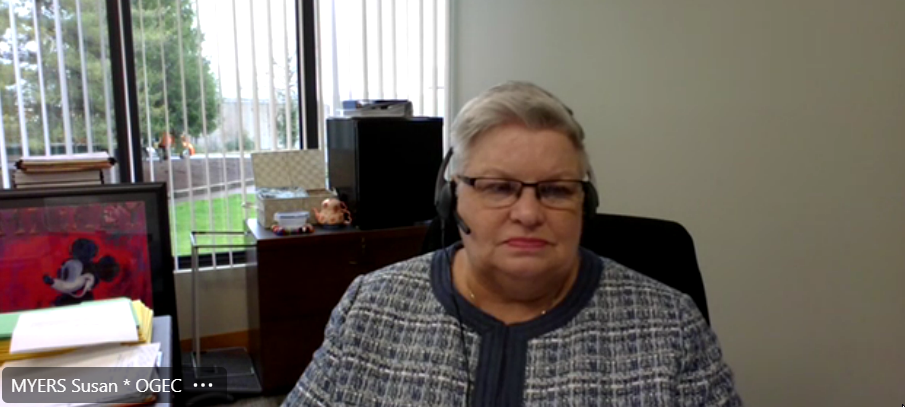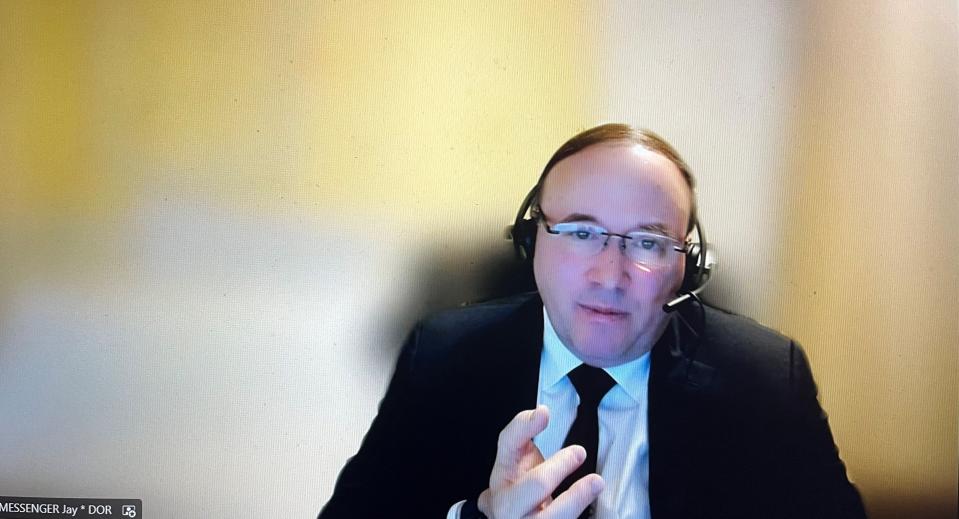Finalists for Oregon Ethics Commission director answer questions during 'meet and greet'
The search for the replacement for the Oregon Government Ethics Commission's current director, Ron Bersin, who is retiring after leading the agency since 2006, is down to two candidates.
Susan Myers and Jay Messenger work in Salem as state government employees. They answered submitted questions Thursday so the commission could better understand how they would respond to potential budget cuts and their leadership style, and their knowledge about the position.
The commission enforces the state’s ethics laws, provides training for public officials and maintains the registry of required economic interest disclosures, registered lobbyists, and quarterly expenditures.
State auditors in 2021 said the nine-member commission could be strengthened and more independent. The commission last year launched an investigation into former secretary of state Shemia Fagan and her potential ethics violations of using state resources for personal benefit and reimbursement of personal expenses. The commission also made headlines after Gov. John Kitzhaber resigned amid an ethics scandal in 2015.
The full commission is set to conduct a final interview with the finalists this week.

Susan Myers, OGEC's compliance and education coordinator
Meyers joined the commission in 2018 as an investigator. She received her bachelor’s in English from the University of Arizona and a master’s degree in English Literature from the University of New Mexico. She moved to Portland in the 1990s and taught English Literature for 10 years at Mt. Hood Community College and Portland Community College before returning to Arizona and attending law school. She worked at a private law firm before becoming an assistant attorney general in Arizona from 2008 through 2016, specializing in antitrust law.

Jay Messenger, internal controls officer for the Oregon Department of Revenue
Messenger was raised in Pennsylvania and attended Temple University for his undergraduate and law degree. He worked for two law firms doing securities regulatory defense and was a senior attorney in the National Association of Securities Dealers’ Department of Enforcement. He taught at Santa Clara University’s School of Law before moving to Oregon in 2010 and teaching at Willamette University’s College of Law. He also briefly worked as a chief of staff for California Assembly member Tony Thurmond in 2016. He joined the Oregon Department of Education as the legal and enforcement director from 2019 to 2022 before his latest position at the Department of Revenue.
Below are responses the finalists gave Thursday during what the commission called a "meet and greet." They have been edited for length and clarity.
What is your understanding of the mission of the Oregon Government Ethics Commission?
Myers: To enforce the areas of law within its jurisdiction and to do so with impartiality. To accept complaints alleging violations of the three areas of law: ethics laws, lobbying laws and the public meetings. Our mission is to enforce those laws, but our mission also is to educate and that part of the mission, education, is, in my mind, primary. We accomplish more by educating people than simply by fining them or sanctioning them. I’m not saying the enforcement is not important but even in the enforcements, in the investigations, and so forth, the goal is still education because we don’t want people to repeat the same offenses.
Messenger: It administers and enforces Oregon government ethics and emphasizes education. Beyond the actual text of it is the government ethics commission deals with lobbying. It deals with government ethics, generally a lot of conflict-of-interest work. It deals with executive session laws. The OGEC has this body of law that they have to administer and enforce and just like any regulatory compliance practice, which I’ve been involved with most of my legal career, is making sure that those rules are adhered to. What I really appreciate about this mission is the education aspect … What any regulator wants is voluntary compliance. So you need the hammer of the enforcement but you also need to be able to teach and get the message out and help people understand … The mission is extremely important in order for people to have faith in government.
What experience do you bring that will help you be successful in this role?
Messenger: My own unique path meets the job duties of this description and would help support me … my law background deals with statutes and regulations. I spent almost a decade teaching in law schools … I’ve had significant management positions.
Myers: Being an English professor, being an attorney … and the years I’ve spent at this agency. Ron Bersin has taught me a lot in those years. I’ve learned a lot. He has intentionally involved me in every aspect of the agency.
What are your top priorities for the agency in the first 30, 60 and 90 days?
Myers: In the first 30 days, the top priority is a successful transition, making sure staff understands expectations and how things will be working but outwardly facing is move the rulemaking process for public meetings law. We’re going to do rulemaking for ethics and lobby laws as well but getting the public meetings law done and getting the rules advisory committee formed is the primary goal for the next 30 to 60 days … And then we also have other items. Budgetary things that have to happen by early February as well legislative concepts … 60 to 90 days would be making sure the rulemaking process gets completed … taking steps to make our agency a little more open and transparent. That may be by providing more information on our website … figuring out where our agency could be more open and providing better information to the public.
Messenger: There’s some information I don’t have because I’m obviously on the outside. I don’t know some of these things but from being involved in the executive leadership team at the Department of Revenue certain deadlines are coming up … I don’t know if (OGEC) has any in the works but I would take a look at that … We have this short session, I don’t know what OGEC has going on in the short session so one is to deal with the legislative issues both for the short session that’s coming up and the 2025 session. What do we need to do to prepare for that? What do you need to do to get the trains running on time and keep the trains running on time … make sure while I’m learning that the work keeps flowing and maintain the high standards that the agency has … I want to make sure the staff feel supported … Getting more on-demand training available. I noticed on the OGEC website that there’s a plan to get more of it out in 2024 so I’d like to make sure that happens.
What opportunities do you see for the commission?
Myers: This has been a major transition not just in terms of Ron leaving but in terms of public meetings law. This is new not just to us, but other than the court system there has been no one in Oregon in all these years enforcing public meetings law … It is an opportunity for the commission and for the commission to meet that part of the mission that I said is preeminent: to provide education to everyone who needs it … Other opportunities are to explore outreach. Not just sending our trainers out to different parts of the state but exploring different ways of reaching our audience …There is an opportunity here for the commission and commission staff to establish better relationships with all of the public bodies that we serve … The other is something that I would propose, a difficult thing … I’ve thought about the benefits that COVID has brought us. I don’t mean COVID itself but meetings like this. We didn’t have Teams and Zoom meetings and all of that pre-COVID and now when the commission meets some of them are present in person and some are present in video … The opportunity for the commission is, as we get new commissioners … it is important that the commission be representative of the entire state. It’s well represented on a political spectrum, I would like to see, maybe, better representation on the statewide spectrum.
Messenger: I see some opportunities in outreach. I've been in the Oregon state government since 2019 ... I took the course every state employee takes, the OGEC intro training that's required but I don't recall outreach done to state employees. I don't know what outreach has been done to other public officials like local employees or local officials, people in boards and commissions across the state so I'd like to do some more outreach ... More on-demand video training ... And could we have little blurbs from opinions or stipulated orders that said here's an example of a potential conflict of interest? Here's an example of an actual conflict of interest.
Why do you want to lead the commission?
Messenger: The mission speaks to me. It's a very important mission ... And I feel like I could really contribute to the work of the commission.
Myers: I have worked very hard for this position ... and that is because I'm very much committed to what this agency is and does and I believe I can help it do more.
Dianne Lugo covers the Oregon Legislature and equity issues. Reach her at dlugo@statesmanjournal.com or on Twitter @DianneLugo
This article originally appeared on Salem Statesman Journal: Two finalists for Oregon Ethics Commission director answer questions

